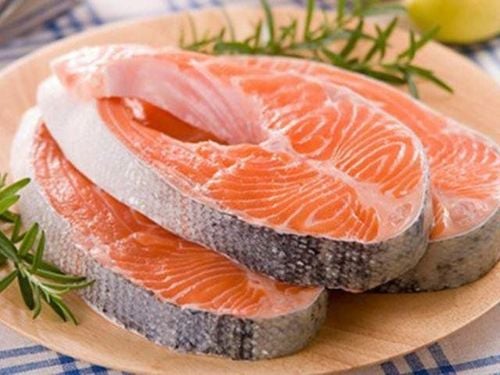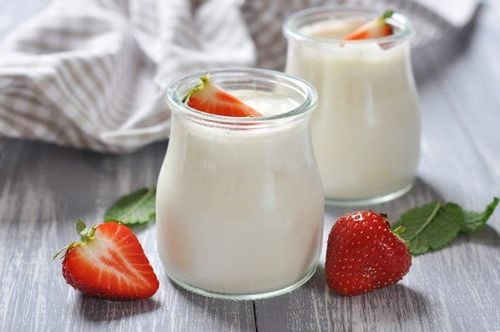This is an automatically translated article.
Schizophrenia is a type of chronic mental disorder. People with this condition experience distorted reality, often experiencing delusions or hallucinations. Medications are important for the treatment of schizophrenia. However, some patients with this disorder may want to consider using an alternative treatment approach including vitamin therapy, fish oil supplements, glycine supplements, dietary management. Thus, food for the mentally ill also plays a certain role in treatment.1. Schizophrenia
Schizophrenia is a type of chronic mental disorder. People with this condition experience distorted reality, often experiencing delusions or hallucinations. Although exact statistics are not available, it is estimated that this disease affects about 1% of the world's population.Misconceptions about schizophrenia are quite common. For example, some think it creates a "divisive personality". In fact, schizophrenia and split personality also known as dissociative identity disorder are two different disorders.
Schizophrenia can occur in both men and women, at any age. Men typically develop symptoms in their late teens or early 20s. Women tend to show signs of the disease later, often in their late 20s and early 30s.
Medication is important for treating schizophrenia. However, some people with this disorder may want to consider alternative treatments. If you choose to use these alternative treatments, work with your doctor to make sure the treatment is safe.
Alternative treatments used for patients with schizophrenia include:
Vitamin treatment Fish oil supplements Glycine supplements Dietary management However, studies support these methods This alternative treatment is limited.

Tâm thần phân liệt là một loại rối loạn tâm thần mạn tính
2. What to eat when suffering from schizophrenia?
People with schizophrenia often have unhealthy diets. Bad eating habits can lead to other health problems that put these people at higher risk for things like heart disease and diabetes.Research shows that certain dietary changes can actually help. Here are some foods to consider and some to avoid for patients with schizophrenia.
2.1. Eat more fruit Many studies show that people with schizophrenia often don't get enough fiber. Fruits like raspberries, pears, apples and others are some of the best sources of fiber.
Fiber helps reduce “bad” cholesterol and aids digestion. A diet rich in fiber can help reduce the risk of some of the health problems commonly associated with schizophrenia, such as heart disease, diabetes, and obesity. At the same time, fruit also has many vitamins that are good for health.
2.2. Eat more vegetables Vegetables are foods that are low in fat and calories, high in fiber and important vitamins, and without any heart-damaging cholesterol. Vegetables are an indispensable food in the diet of patients with schizophrenia. Potassium is also an important nutrient that can help control your blood sugar. Potassium is found in vegetables such as lima beans, kidney beans, and sweet potatoes.
2.3. Eat salmon and other fatty fish Your body cannot make omega-3 fatty acids. You need to get them through food. Why do you need omega-3 fatty acids? An increasing number of studies say that omega-3 fatty acids can prevent and alleviate the symptoms of schizophrenia and slow its progression.
Salmon and mackerel are excellent sources of those acids. If you don't like fish, ask your doctor about omega-3 supplements.

Ngày càng có nhiều nghiên cứu nói rằng axit béo omega-3 có thể ngăn ngừa và làm giảm nhẹ các triệu chứng của bệnh tâm thần phân liệt
2.5. Eat oysters and crabs Experts say there may be a link between low zinc levels and schizophrenia. Oysters, crab, and lobster are foods high in these nutrients. You can also find zinc in beef and in fortified cereals. Zinc is also available in supplements, but talk to your doctor before you take any.
2.6. Clam should be eaten Some reports suggest low levels of vitamin B12 in people with psychosis - a collection of mental disorders of which schizophrenia is one of them. Other research suggests that a little extra B12 can reduce symptoms.
Clams are a great source of B12. Vitamin B12 is also found in liver, salmon and in some breads. Supplements can be helpful, but check with your doctor before using them.
2.7. Should eat more spinach King of green leafy vegetables, spinach is high in folate. Folate is called folic acid when it is used in supplements or to fortify foods. It may help ease the symptoms of schizophrenia. Along with spinach, you can find it in black beans, asparagus, and beef liver.
2.8. Cod liver oil should be eaten. Studies on the effects of vitamin D on schizophrenia are mixed. However, getting more Vitamin D may help some people with this disorder. Vitamin D is made primarily from sun exposure, but is available naturally in cod liver oil, salmon, and swordfish
2.9. Should eat yogurt Gut microbiota has received a lot of attention. Several studies have linked harmful bacteria in the gut to schizophrenia. Supplementing with prebiotics can be helpful, prebiotics are found naturally in fruits and vegetables. Adding the probiotics found in yogurt, kimchi, and sauerkraut may also be helpful for patients with schizophrenia. Try to avoid products that contain casein antibodies.

Thêm men vi sinh có trong sữa chua, kim chi và dưa cải bắp cũng có thể hữu ích cho bệnh nhân tâm thần phân liệt
2.11. Don't Eat Refined Sugar Experts have well established that most people with schizophrenia are poor eaters and their diabetes rates are higher. A diet that helps keep blood sugar low — a measure of blood sugar — may reduce symptoms of schizophrenia. Cutting out refined sugar, found in things like sugary drinks, candy, and cakes, is a good way to start keeping blood sugar in the normal range.
Medicines are important to treat schizophrenia. However, some patients with this disorder may want to consider using an alternative treatment approach including vitamin therapy, fish oil supplements, glycine supplements, dietary management. Thus, food for the mentally ill also plays a certain role in treatment. There are foods that are good and there are foods that are not good for patients with schizophrenia.
If you have a need for consultation and examination at Vinmec Hospitals under the nationwide health system, please book an appointment on the website for service.
Please dial HOTLINE for more information or register for an appointment HERE. Download MyVinmec app to make appointments faster and to manage your bookings easily.
Reference sources: webmd.com, healthline.com












